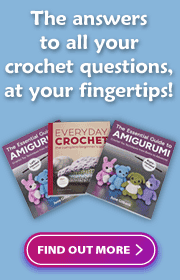I’ll be sharing my process as I design my amigurumi Meerkat crochet pattern – hope you find this behind-the-scenes journey through what goes into a PlanetJune design interesting!
I originally intended to design my meerkat during the Ravellenic Games, and this (below) is the first and only post I managed to complete before I realised I was too busy with book edits to continue with the design at that time. Now I’m resuming the design, so let’s go back to the start and get you caught up…
Part 1: Research, Shape, Colour and Sketch
Stage 1 of the meerkat design is complete 🙂 This stage goes through from researching the animal to drawing my sketch, and there’s a lot of work involved!
Research: To get an idea of my process, take a look at my blog post showing how I designed my Pteranodon:
In this case, as I want a realistic meerkat, I didn’t really look at other amigurumi designs beyond a quick glance to see what’s out there, as I don’t want to accidentally be influenced by them – only by real meerkats. I spent a long time studying meerkat shape, posture and colouring, via google, and from my own photos like this one:

Once I’ve finished the research, I have a few more decisions to make:
Shape: proportions, positions. I decide on the best position based on what I like best, what I think will be most recognisable, and what will translate into a good pattern (i.e. stable so it won’t fall over, and easy to crochet).
Colour, part 1 – How many colours to use: It’s a trade-off between more colours (more realistic) and fewer colours (easy for you to follow the pattern). Critical details must be included, but others can be simplified so it still ‘reads’ as the animal but with my clean, simple style. For instance, I originally considered 6 shades for my Red Panda design (light red, dark red, dark brown, black, white, cream), but managed to simplify it down to 3 (aren’t you glad I did?!) and it still clearly says Red Panda:
Colour, part 2 – Amount of colourwork: This is a trade-off between simplicity and recognisability: a pattern with a colour change in every stitch may have a beautiful result, but be too frustrating for you to want to crochet. So, again, I limit the colourwork to what I decide is essential to make the animal unmistakable, and simplify the rest.
Colour, part 3 – Which specific shades: This is a decision that only really affects my sample, as very few of you will use the exact same yarns I did. But a good picture really sells the design, so I need my sample to look as amazing as possible! The shades I choose are a compromise between the colours I’d most like to see and the closest colours in my stash; the closest suppliers of my amigurumi yarns are thousands of miles away, so I don’t have the luxury of shopping for missing shades.
I only ever mix yarns if they have comparable weight and sheen (see my worsted weight yarn comparison) as otherwise the pattern would be yarn dependent, having different gauge and appearance for different parts. I always use only one type of yarn in any one design, so, whatever yarn you have available, all you need to do is pick the closest shades in the yarn you prefer (or have access to) and the pattern will work out for you. I originally intended to use Vanna’s Choice for the meerkat, but my supplies are perilously low, so, in the end, these are the colours I decided on (Red Heart Soft in Wheat and Chocolate):

Sketch: After making all these decisions, I finally reach the point where I can draw my sketch. Now don’t worry: the sketch isn’t supposed to look exactly like the final meerkat – it’s just a reference for the basic shape (sitting up, not on all four paws or standing balancing on those spindly legs and tail!) and the colours I plan to use. Especially when there’s colourwork involved, getting the shape and colours to all work together and look symmetrical means the finished animal will never look exactly like my sketch, so there’s not much point in me trying to draw a work of art! This is just to remind me of the decisions I’ve made up to this point and to give me a starting point when I pick up my hook:

And yes, I do draw in pink (or aqua, or purple) pen – it makes my notes more fun, and gives me permission to not try to make my sketch perfect, as I can’t erase pen 🙂
Next up, stay tuned for stage 2: deciding how to best reproduce this sketch in crochet!


















Michelle said
Waiting patiently for the next stage. 🙂
June said
Check back on Monday 😉